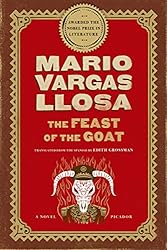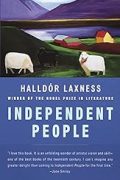
Rating: 8.2/10.
Historical novel by a Peruvian novelist about Rafael Trujillo, the dictator of the Dominican Republic for 31 years from 1930 to 1961. The book is largely based on true historical events and includes many real historical figures, but also introduces some fictional characters and events. These never conflict with what might have actually occurred within the regime, but the thoughts of various characters and the dictator himself are invented for dramatic effect. The story focuses on the last few weeks of Trujillo’s regime before he was assassinated, presenting the viewpoints of several different people around his administration, and a lot of it is having characters talk about past events to give more context about how the regime was structured. Through the lens of many people close to Trujillo, including Trujillo himself, we gain insight into how a dictatorship is run and the chaotic aftermath following a leader’s assassination.
The novel primarily revolves around three main threads, alternating between them every chapter. These segments are not in chronological order and often jump from the past to the present. The first plot thread centers on Urania Cabral and her father, Agustin Cabral. Urania has established a life in New York as a successful lawyer and hasn’t returned to her home country for decades. In the first chapter, she revisits her elderly father in Santo Domingo, and her father cannot speak, so it is only Urania talking and reflecting on the past. Agustin was a senator close to Trujillo and fervently supported him until he was mysteriously dismissed from his government position, never truly understanding why. In his desperation to regain Trujillo’s trust, it’s revealed towards the end that he allows his daughter to be raped by Trujillo as an act of sacrifice and devotion.
The second plot thread focuses on Trujillo himself and his inner government. It describes his daily routines and frequent meetings with several high-ranking officials, such as Johnny Abbes, the head of the secret police, and Chirinos, commonly referred to as the “Walking Turd,” who handles legal affairs and the state’s finances. Trujillo, while highly intelligent, is also deeply paranoid: he often tests the loyalty of his top officials and punishes anyone who crosses him, sometimes even ordering assassinations beyond his borders (this attracted negative attention from the US and resulting in economic sanctions). Almost everyone under him is constantly on edge, unsure if they will be the next to be dismissed or executed.
Trujillo faces with multiple challenges: managing international relations with the US and other Latin American nations, keeping the country afloat, overseeing his government and state hierarchy, and handling his own family affairs. He is disappointed in his two sons, who show no interest in politics, leaving him the sole burden of governing. His bureaucracy is filled with yes-men, and he is ever-paranoid about who to trust and who is potentially conspiring against him. His oldest son, Ramfis, is always causing trouble overseas and squandering money. On a personal level, Trujillo struggles with health issues, as he cannot control his urination and goes to great lengths to hide it from officials to avoid embarrassment.
The third plot thread revolves around the conspirators, including Lieutenant Amadito, Antonio Imbert, Salvador, Antonio de la Maza, and a few others. We see why each of them is driven to hate Trujillo and attempt to kill him. Various reasons motivate them; for instance, one conspirator seeks revenge for his brother, who was unfairly killed by Trujillo. They had harbored intentions to kill Trujillo for a while and even received assistance from the US in the form of weapons. The majority of it takes place on a highway at night, where they wait for Trujillo to pass. As he finally appears, they chase down Trujillo’s car and shoot him.
The final third of the novel deals with the aftermath of the assassination. When government members learn of their leader’s demise, Pupo Roman, the original commander of the army, had originally planned to initiate a coup against the regime, but he hesitates, gets captured, and the conspirators are forced into hiding. With their photographs everywhere, anyone assisting them will be killed. Several are killed in shootouts with the police. The few who are taken alive are brutally tortured for months, with only one managing to remain concealed until the turmoil subsided.
Chaos engulfs the government as multiple factions, including Johnny Abbes, Pupo Roman, and the dictator’s son, Ramfis, along with his brothers, vie for power. Yet, it is Balaguer who emerges as the composed leader, previously considered a puppet president and a mere clerk, he calmly persuades the old regime to leave the country without bloodshed. He then skillfully steers the nation towards democracy, aligning more closely with the US.
The final chapter focuses on Urania’s rape at Trujillo’s place, explaining why she’s been so cold all her life, why she’s never been in a relationship, and why she still harbors hatred towards her father. Trujillo accepts Senator Cabral’s sacrifice of his 14-year-old virgin daughter. Throughout the novel, we see Trujillo womanizing on young girls, and he enjoys sleeping with the wives of various government officials, sending the husbands away so he can be alone with their wives. His power is so absolute that these husbands must thank him for the pleasure. Overall, this is a powerful novel that reveals the human side and costs of dictatorships, as well as the dynamics of power structures within them.



